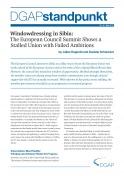European Commission President Jean-Claude Juncker set a high bar in his State of the Union address in September 2018 when he stressed that “Sibiu is the moment we must offer all Europeans a strong perspective for the future”. The summit of the European Council in the central Romanian city was designed as a key event to underscore the unity of the European Union. Only two weeks ahead of the European parliamentary election, it was intended to conclude the debate on the ‘Future of Europe’ that started as a direct reaction to the United Kingdom’s 2016 decision to leave the EU. With original expectations that Brexit would have come to pass by now, the summit was supposed to illustrate the EU’s achievements, strengthen its legitimacy, combat Euroskepticism and connect the union with disaffected citizens. At Sibiu, the EU was meant to look forward and move into the future.
Expectations Meet Reality: Paralysis and Division Hinder EU Progress
However, not much is left of these high-flying ambitions. The mismatch between former expectations and today’s political reality speaks volumes about the state of the EU. The decision to postpone Brexit has disrupted the timing and narrative of the Sibiu summit. Concerns about rising anti-EU populist parties have paralyzed political leaders in a number of EU member states. Even more, the EU’s current Romanian Presidency is itself embroiled in conflict with Brussels for backsliding on the rule of law: Only in March, the European Commission cited the government of Prime Minister Viorica Dăncilă for hindering the appointment of prominent anti-corruption fighter Laura Codruta Kovesi to the post of the new European Public Prosecutor.
EU leaders are likely to avoid substantial, and possibly divisive, debates in Sibiu – despite the urgency to demonstrate, both the willingness to act and the ability to define a forward-looking agenda for the EU-27. Instead, they will limit themselves to preliminary discussions on the new Strategic Agenda for the next five years and postpone major decisions to the European Council meeting on 20/21 June when the final document is due to be adopted.
Europe’s Paradox: Citizens Embrace EU, Governments Hesitate
The European Council’s gap between declared ambition and likely real achievement at this moment of strategic importance ahead of the EU’s new institutional cycle is the more striking as it is actually paradoxical: Most heads of state and government, with the notable exception of France’s President Emmanuel Macron, have not put forward European ambitions that seem up to the challenge. By contrast citizens’ support for the European Union has actually increased since the Brexit referendum of 2016.
According to the European Parliament’s Spring 2019 Eurobarometer, which was conducted three months ahead of the European election, more than two thirds (68 percent) of citizens in the EU-27 believe that their countries have benefitted from being a member of the EU. In total, 61 per cent say that their country’s membership is a good thing. This is a marked increase from 60 percent and 53 percent respectively shortly after the United Kingdom’s Brexit Referendum in 2016. EU member states have also returned to a path of economic growth and the EU has overall remained resilient despite the many internal and external challenges it has been facing in recent years.
From Bad to Worse: More Challenges to Come
As the run-up to the Sibiu summit reveals, however, Europe’s situation today is much more challenging than it was five years ago, and it is likely to remain so: The level of fragmentation and distrust among member states has increased. Ruptures have emerged between the Union’s North and South in the wake of the European sovereign debt crisis, and between the East and West over migration. EU governments have been increasingly unable to achieve reforms in key policy areas, for instance on migration or the euro area. As European governments have missed this window of opportunity to make the EU crisis-proof, the EU may also be confronted with economic stagnation in the coming years. In addition, with the parliamentary election drawing near, some political parties in member states, such as France’s Rassemblement National, formerly Front National, or the Italian Lega, are openly Euroskeptic and seek to destabilize the future European parliament from within. Some EU members, such as Poland, Hungary and Romania, run foul of basic principles of the Union by openly undermining the rule of law or democracy in their countries.
The Tasks Ahead: Agenda, Personnel, Finances
And yet, crucial tasks lie ahead: The divisions in the European Council will likely complicate agreement on a coherent and consistent Strategic Agenda that outlines ambitious priorities for the EU’s next five years. A complex leadership puzzle also awaits the EU as five top jobs need to be filled at the helm of the European Commission, the European External Action Service, the European Council, the European Parliament and the European Central Bank. Finding an agreement that takes into account party-political, geographic, age and gender criteria may well take until the end of 2019. Finally, the next Multiannual Financial Framework (MFF) for 2021 to 2027 will have to be negotiated – a huge bargaining process that involves trade-offs between member states and between policy fields. This lengthy and tedious process might turn out to be even more complicated and may only be concluded under the German EU Council Presidency in the second half of 2020.
There is an indisputable risk that both, the political divides among member states’ governments and the readiness of more Europeans to cast anti-EU votes, will leave the EU in a defensive and reactionary mode. This is of concern also as external challenges, such as the EU’s deteriorating security environment or the decline of transatlantic relations, are likely to increase. Equally, interferences in the EU will continue to rise, for example as a result of populist parties’ ties with Russia, and Russian efforts to undermine the stability of the European Union, for instance by means of regional conflicts or disinformation campaigns.
Options for Action: Pragmatism and Efficiency
Given these internal and external challenges, the most viable course for EU leaders in the near future is to aim for pragmatism and incremental adjustments rather than large-scale ambitions. This applies, in particular, to those policy priorities in which member states cannot deliver solutions on their own, but in which, together in the EU, they can make a real difference to their citizens. The pragmatic but realistic slogan of the Strategic Priorities for the last European Commission, “big on big things, small on small things”, remains topical in this context. Issues of choice for the EU agenda should therefore be security and defense, climate protection and energy, migration, the euro area and the Single Market.
Where stalemate cannot be overcome, EU member states should opt for enhanced cooperation as a pragmatic instrument to move beyond the smallest common denominator. Staying true to the EU’s guiding principles of openness, inclusiveness and efficiency in such cooperation can maintain the EU’s ability and responsiveness in addressing current and future challenges. Moving towards Qualified Majority Voting in certain policy fields, particularly in foreign policy, could also ensure greater efficiency in decision-making. Of course, it would be difficult to implement in times of deepening internal divisions.
Keeping the Union: Cooperation and Cohesion
The Sibiu summit – which takes place on the anniversary of the 1950 Schuman declaration that paved the way for the European Economic Community and subsequently the European Union – comes at a moment of strategic importance for the EU. That it will hardly meet its initially high expectations, however, does not necessarily say much about the EU’s mid-term future after the European parliamentary election. EU leaders anxiously expect the outcome of the polls and the implications which the likely reshuffle of the party-political landscape will have for the institutional functioning of the European Union. Most probably, the EU will be even more fragmented and complex after May 26. In this scenario, the task is to drive forward pragmatic cooperation in specific policy fields and to involve those countries which are willing to tackle the complex issues in a cooperative and integrated manner. If they manage to do so while preserving the Union’s political, legal and institutional cohesion, they are likely to be successful. If other member states wish to join them, they are welcome to make themselves heard.



